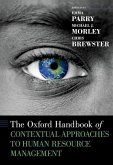The Oxford Handbook of Skills and Training
Herausgeber: Warhurst, Chris
The Oxford Handbook of Skills and Training
Herausgeber: Warhurst, Chris
- Gebundenes Buch
- Merkliste
- Auf die Merkliste
- Bewerten Bewerten
- Teilen
- Produkt teilen
- Produkterinnerung
- Produkterinnerung
Skills and workforce development are at the heart of much research on work, employment, and management. Policy makers and managers often consider the better development of skills to be the answer to a range of practical and policy challenges. This Handbook sheds new light on all the major issues concerning skills and training today
Andere Kunden interessierten sich auch für
![The Oxford Handbook of Participation in Organizations The Oxford Handbook of Participation in Organizations]() The Oxford Handbook of Participation in Organizations222,99 €
The Oxford Handbook of Participation in Organizations222,99 €![The Oxford Handbook of Contextual Approaches to Human Resource Management The Oxford Handbook of Contextual Approaches to Human Resource Management]() The Oxford Handbook of Contextual Approaches to Human Resource Management246,99 €
The Oxford Handbook of Contextual Approaches to Human Resource Management246,99 €![The Oxford Handbook of Organizational Change and Innovation The Oxford Handbook of Organizational Change and Innovation]() The Oxford Handbook of Organizational Change and Innovation263,99 €
The Oxford Handbook of Organizational Change and Innovation263,99 €![The Oxford Handbook of Organizational Identity The Oxford Handbook of Organizational Identity]() The Oxford Handbook of Organizational Identity228,99 €
The Oxford Handbook of Organizational Identity228,99 €![The Oxford Handbook of Individual Differences in Organizational Contexts The Oxford Handbook of Individual Differences in Organizational Contexts]() Aybars TuncdoganThe Oxford Handbook of Individual Differences in Organizational Contexts191,99 €
Aybars TuncdoganThe Oxford Handbook of Individual Differences in Organizational Contexts191,99 €![The Oxford Handbook of Human Resource Management The Oxford Handbook of Human Resource Management]() Peter BoxallThe Oxford Handbook of Human Resource Management285,99 €
Peter BoxallThe Oxford Handbook of Human Resource Management285,99 €![The Oxford Handbook of Organizational Well-Being The Oxford Handbook of Organizational Well-Being]() The Oxford Handbook of Organizational Well-Being245,99 €
The Oxford Handbook of Organizational Well-Being245,99 €-
-
-
Skills and workforce development are at the heart of much research on work, employment, and management. Policy makers and managers often consider the better development of skills to be the answer to a range of practical and policy challenges. This Handbook sheds new light on all the major issues concerning skills and training today
Hinweis: Dieser Artikel kann nur an eine deutsche Lieferadresse ausgeliefert werden.
Hinweis: Dieser Artikel kann nur an eine deutsche Lieferadresse ausgeliefert werden.
Produktdetails
- Produktdetails
- Verlag: Oxford University Press (UK)
- Seitenzahl: 756
- Erscheinungstermin: 2. April 2017
- Englisch
- Abmessung: 254mm x 180mm x 45mm
- Gewicht: 1449g
- ISBN-13: 9780199655366
- ISBN-10: 0199655367
- Artikelnr.: 47865197
- Herstellerkennzeichnung
- Libri GmbH
- Europaallee 1
- 36244 Bad Hersfeld
- 06621 890
- Verlag: Oxford University Press (UK)
- Seitenzahl: 756
- Erscheinungstermin: 2. April 2017
- Englisch
- Abmessung: 254mm x 180mm x 45mm
- Gewicht: 1449g
- ISBN-13: 9780199655366
- ISBN-10: 0199655367
- Artikelnr.: 47865197
- Herstellerkennzeichnung
- Libri GmbH
- Europaallee 1
- 36244 Bad Hersfeld
- 06621 890
Chris Warhurst PhD is Professor and Director of the Institute for Employment Research at the University of Warwick in the UK, a Trustee of the Tavistock Institute in London and a Research Associate of the Centre on Skills, Knowledge and Organisational Performance (SKOPE) at Oxford University. He has published a number of books and articles on skills, including, with colleagues, The Skills that Matter (Palgrave, 2004) and Are Bad Jobs Inevitable? (Palgrave, 2012). He has been expert advisor on skills policy to the UK, Scottish and Australian Governments and an International Expert Adviser to the OECD's LEED programme. Ken Mayhew is Emeritus Professor of Education and Economic Performance, at Oxford University, Emeritus Fellow in Economics at Pembroke College Oxford, Extraordinary Professor at Maastricht University and a member of the Armed Forces Pay Review Body. He was founding director of SKOPE, an ESRC research centre on skills, knowledge and organizational performance. He has published widely in labour economics and policy analysis, and advised many private and public sector organisations at home and abroad. David Finegold is a Distinguished Professor at Rutgers University and is the founding Chief Academic Officer for American Honors. He is a leading international expert on skill development systems and their relationship to the changing world of work and economic performance. John Buchanan is Professor in the Research Development Unit at the University of Sydney Business School. Until recently his major research interest has been the demise of the classical wage-earner model of employment and the role of the state in nurturing new forms of multi-employer coordination in the labour market. Building on this he is devoting special attention to the evolution of the labour contract, the dynamics of workforce development and the relationship between work and health. He is especially interested in building cross disciplinary research teams to examine these issues. His most recent co-edited book is Inclusive Growth in Australia: Social Policy as Economic Investment (2013).
* Introduction
* Skills and Training: Multiple Targets, Shifting Terrain
* Section I: Concepts, Definitions and Measurements of Skill
* 1: Jane Bryson: Disciplinary Perspectives on Skill
* 2: Cathie Jo Martin: Skill Builders: The Evolution of National
Vocational Training Systems
* 3: Jonathan Payne: The Changing Meaning of Skill: Still Contested,
Still Important
* 4: Chris Warhurst, Chris Tilly and Mary Gatta: A New Social
Construction of Skill
* 5: Michael Handel: Measuring Job Content: Skills, Technology and
Management Practices
* 6: Gordon Stanley: Accreditation and Assessment in Vocational
Education and Training
* Section II: Education, Training and the Development of Workforce
Skills
* 7: Paul Dalziel: Education and Qualifications as Skills
* 8: John Polesel: Pre-Employment Skill Formation in Australia and
Germany
* 9: Robert Lerman: Skill Development in Middle Level Occupations: The
Role of Apprenticeship Training
* 10: Martin Humburg and Rolf Van der Velden: What is Expected of
Higher Education Graduates in the 21st Century?
* 11: Lorna Unwin: Employer-led In-Work Training and Skill Formation:
The Challenges of Multi-Varied and Contingent Phenomena
* 12: Mark Stuart and Tony Huzzard: Unions, the Skills Agenda and
Workforce Development
* 13: Gunter Schmid: A Working Lifetime of Skill and Training Needs
* Section III: Skills Demand and Deployment
* 14: David W. Livingston: Skill Under-utilization
* 15: David Ashton, Caroline Lloyd and Chris Warhurst: Business
Strategies and Skills
* 16: Alan Felstead, Duncan Gallie and Francis Green: Measuring Skills
Stock, Job Skills and Skills Mismatch
* Section IV: Skill Outcomes
* 17: Craig Holmes: The Individual Benefits of Investing in Skills
* 18: Irena Grugulis, Craig Holmes and Ken Mayhew: The Economic and
Social Benefits of Skills
* Section V: Differing Skill Systems: The Levels of Determination
* 19: Hugh Lauder, Phillip Brown and David Ashton: Theorising Skill
Formation in the Global Economy
* 20: Gerhard Bosch: Different National Skill Systems
* 21: John Buchanan, Pauline Anderson and Gail Power: Skill Ecosystems
* 22: Alice Lam and David Marsden: Employment Systems, Skills and
Knowledge
* Section VI: Differing Skill Systems: The Dynamics of Development in a
Global Economy
* 23: Caroline Smith: Skill Demands and Developments in the Advanced
Economies
* 24: Johnny Sung and Arwen Raddon: Approaches to Skills in the Asian
Developmental States
* 25: Mingwei Liu and David Finegold: Emerging Economic Powers: The
Transformation of the Skills Systems in China and India
* Section VII: Current Challenges
* 26: Stuart W. Elliott: Projecting the Impact of IT on Work and Skills
in the 2030s
* 27: James Wickham: International Skill Flows and Migration
* 28: Mari Sako: Professional Skills: Impact of Comparative Political
Economy
* 29: Wendy Loretto, Chris Phillipson, Sarah Vickerstaff: Skills and
Training for the Older Population: Training the New Work Generation
* 30: Leesa Wheelahan: Rethinking Skills Development: Moving Beyond
Competency-Based Training
* 31: Terence Hogarth and Lynn Gambin: Who Pays for Skills? Differing
perspectives on who should pay and why
* 32: Ewart Keep: Financial Constraints and Policy Implications
* Skills and Training: Multiple Targets, Shifting Terrain
* Section I: Concepts, Definitions and Measurements of Skill
* 1: Jane Bryson: Disciplinary Perspectives on Skill
* 2: Cathie Jo Martin: Skill Builders: The Evolution of National
Vocational Training Systems
* 3: Jonathan Payne: The Changing Meaning of Skill: Still Contested,
Still Important
* 4: Chris Warhurst, Chris Tilly and Mary Gatta: A New Social
Construction of Skill
* 5: Michael Handel: Measuring Job Content: Skills, Technology and
Management Practices
* 6: Gordon Stanley: Accreditation and Assessment in Vocational
Education and Training
* Section II: Education, Training and the Development of Workforce
Skills
* 7: Paul Dalziel: Education and Qualifications as Skills
* 8: John Polesel: Pre-Employment Skill Formation in Australia and
Germany
* 9: Robert Lerman: Skill Development in Middle Level Occupations: The
Role of Apprenticeship Training
* 10: Martin Humburg and Rolf Van der Velden: What is Expected of
Higher Education Graduates in the 21st Century?
* 11: Lorna Unwin: Employer-led In-Work Training and Skill Formation:
The Challenges of Multi-Varied and Contingent Phenomena
* 12: Mark Stuart and Tony Huzzard: Unions, the Skills Agenda and
Workforce Development
* 13: Gunter Schmid: A Working Lifetime of Skill and Training Needs
* Section III: Skills Demand and Deployment
* 14: David W. Livingston: Skill Under-utilization
* 15: David Ashton, Caroline Lloyd and Chris Warhurst: Business
Strategies and Skills
* 16: Alan Felstead, Duncan Gallie and Francis Green: Measuring Skills
Stock, Job Skills and Skills Mismatch
* Section IV: Skill Outcomes
* 17: Craig Holmes: The Individual Benefits of Investing in Skills
* 18: Irena Grugulis, Craig Holmes and Ken Mayhew: The Economic and
Social Benefits of Skills
* Section V: Differing Skill Systems: The Levels of Determination
* 19: Hugh Lauder, Phillip Brown and David Ashton: Theorising Skill
Formation in the Global Economy
* 20: Gerhard Bosch: Different National Skill Systems
* 21: John Buchanan, Pauline Anderson and Gail Power: Skill Ecosystems
* 22: Alice Lam and David Marsden: Employment Systems, Skills and
Knowledge
* Section VI: Differing Skill Systems: The Dynamics of Development in a
Global Economy
* 23: Caroline Smith: Skill Demands and Developments in the Advanced
Economies
* 24: Johnny Sung and Arwen Raddon: Approaches to Skills in the Asian
Developmental States
* 25: Mingwei Liu and David Finegold: Emerging Economic Powers: The
Transformation of the Skills Systems in China and India
* Section VII: Current Challenges
* 26: Stuart W. Elliott: Projecting the Impact of IT on Work and Skills
in the 2030s
* 27: James Wickham: International Skill Flows and Migration
* 28: Mari Sako: Professional Skills: Impact of Comparative Political
Economy
* 29: Wendy Loretto, Chris Phillipson, Sarah Vickerstaff: Skills and
Training for the Older Population: Training the New Work Generation
* 30: Leesa Wheelahan: Rethinking Skills Development: Moving Beyond
Competency-Based Training
* 31: Terence Hogarth and Lynn Gambin: Who Pays for Skills? Differing
perspectives on who should pay and why
* 32: Ewart Keep: Financial Constraints and Policy Implications
* Introduction
* Skills and Training: Multiple Targets, Shifting Terrain
* Section I: Concepts, Definitions and Measurements of Skill
* 1: Jane Bryson: Disciplinary Perspectives on Skill
* 2: Cathie Jo Martin: Skill Builders: The Evolution of National
Vocational Training Systems
* 3: Jonathan Payne: The Changing Meaning of Skill: Still Contested,
Still Important
* 4: Chris Warhurst, Chris Tilly and Mary Gatta: A New Social
Construction of Skill
* 5: Michael Handel: Measuring Job Content: Skills, Technology and
Management Practices
* 6: Gordon Stanley: Accreditation and Assessment in Vocational
Education and Training
* Section II: Education, Training and the Development of Workforce
Skills
* 7: Paul Dalziel: Education and Qualifications as Skills
* 8: John Polesel: Pre-Employment Skill Formation in Australia and
Germany
* 9: Robert Lerman: Skill Development in Middle Level Occupations: The
Role of Apprenticeship Training
* 10: Martin Humburg and Rolf Van der Velden: What is Expected of
Higher Education Graduates in the 21st Century?
* 11: Lorna Unwin: Employer-led In-Work Training and Skill Formation:
The Challenges of Multi-Varied and Contingent Phenomena
* 12: Mark Stuart and Tony Huzzard: Unions, the Skills Agenda and
Workforce Development
* 13: Gunter Schmid: A Working Lifetime of Skill and Training Needs
* Section III: Skills Demand and Deployment
* 14: David W. Livingston: Skill Under-utilization
* 15: David Ashton, Caroline Lloyd and Chris Warhurst: Business
Strategies and Skills
* 16: Alan Felstead, Duncan Gallie and Francis Green: Measuring Skills
Stock, Job Skills and Skills Mismatch
* Section IV: Skill Outcomes
* 17: Craig Holmes: The Individual Benefits of Investing in Skills
* 18: Irena Grugulis, Craig Holmes and Ken Mayhew: The Economic and
Social Benefits of Skills
* Section V: Differing Skill Systems: The Levels of Determination
* 19: Hugh Lauder, Phillip Brown and David Ashton: Theorising Skill
Formation in the Global Economy
* 20: Gerhard Bosch: Different National Skill Systems
* 21: John Buchanan, Pauline Anderson and Gail Power: Skill Ecosystems
* 22: Alice Lam and David Marsden: Employment Systems, Skills and
Knowledge
* Section VI: Differing Skill Systems: The Dynamics of Development in a
Global Economy
* 23: Caroline Smith: Skill Demands and Developments in the Advanced
Economies
* 24: Johnny Sung and Arwen Raddon: Approaches to Skills in the Asian
Developmental States
* 25: Mingwei Liu and David Finegold: Emerging Economic Powers: The
Transformation of the Skills Systems in China and India
* Section VII: Current Challenges
* 26: Stuart W. Elliott: Projecting the Impact of IT on Work and Skills
in the 2030s
* 27: James Wickham: International Skill Flows and Migration
* 28: Mari Sako: Professional Skills: Impact of Comparative Political
Economy
* 29: Wendy Loretto, Chris Phillipson, Sarah Vickerstaff: Skills and
Training for the Older Population: Training the New Work Generation
* 30: Leesa Wheelahan: Rethinking Skills Development: Moving Beyond
Competency-Based Training
* 31: Terence Hogarth and Lynn Gambin: Who Pays for Skills? Differing
perspectives on who should pay and why
* 32: Ewart Keep: Financial Constraints and Policy Implications
* Skills and Training: Multiple Targets, Shifting Terrain
* Section I: Concepts, Definitions and Measurements of Skill
* 1: Jane Bryson: Disciplinary Perspectives on Skill
* 2: Cathie Jo Martin: Skill Builders: The Evolution of National
Vocational Training Systems
* 3: Jonathan Payne: The Changing Meaning of Skill: Still Contested,
Still Important
* 4: Chris Warhurst, Chris Tilly and Mary Gatta: A New Social
Construction of Skill
* 5: Michael Handel: Measuring Job Content: Skills, Technology and
Management Practices
* 6: Gordon Stanley: Accreditation and Assessment in Vocational
Education and Training
* Section II: Education, Training and the Development of Workforce
Skills
* 7: Paul Dalziel: Education and Qualifications as Skills
* 8: John Polesel: Pre-Employment Skill Formation in Australia and
Germany
* 9: Robert Lerman: Skill Development in Middle Level Occupations: The
Role of Apprenticeship Training
* 10: Martin Humburg and Rolf Van der Velden: What is Expected of
Higher Education Graduates in the 21st Century?
* 11: Lorna Unwin: Employer-led In-Work Training and Skill Formation:
The Challenges of Multi-Varied and Contingent Phenomena
* 12: Mark Stuart and Tony Huzzard: Unions, the Skills Agenda and
Workforce Development
* 13: Gunter Schmid: A Working Lifetime of Skill and Training Needs
* Section III: Skills Demand and Deployment
* 14: David W. Livingston: Skill Under-utilization
* 15: David Ashton, Caroline Lloyd and Chris Warhurst: Business
Strategies and Skills
* 16: Alan Felstead, Duncan Gallie and Francis Green: Measuring Skills
Stock, Job Skills and Skills Mismatch
* Section IV: Skill Outcomes
* 17: Craig Holmes: The Individual Benefits of Investing in Skills
* 18: Irena Grugulis, Craig Holmes and Ken Mayhew: The Economic and
Social Benefits of Skills
* Section V: Differing Skill Systems: The Levels of Determination
* 19: Hugh Lauder, Phillip Brown and David Ashton: Theorising Skill
Formation in the Global Economy
* 20: Gerhard Bosch: Different National Skill Systems
* 21: John Buchanan, Pauline Anderson and Gail Power: Skill Ecosystems
* 22: Alice Lam and David Marsden: Employment Systems, Skills and
Knowledge
* Section VI: Differing Skill Systems: The Dynamics of Development in a
Global Economy
* 23: Caroline Smith: Skill Demands and Developments in the Advanced
Economies
* 24: Johnny Sung and Arwen Raddon: Approaches to Skills in the Asian
Developmental States
* 25: Mingwei Liu and David Finegold: Emerging Economic Powers: The
Transformation of the Skills Systems in China and India
* Section VII: Current Challenges
* 26: Stuart W. Elliott: Projecting the Impact of IT on Work and Skills
in the 2030s
* 27: James Wickham: International Skill Flows and Migration
* 28: Mari Sako: Professional Skills: Impact of Comparative Political
Economy
* 29: Wendy Loretto, Chris Phillipson, Sarah Vickerstaff: Skills and
Training for the Older Population: Training the New Work Generation
* 30: Leesa Wheelahan: Rethinking Skills Development: Moving Beyond
Competency-Based Training
* 31: Terence Hogarth and Lynn Gambin: Who Pays for Skills? Differing
perspectives on who should pay and why
* 32: Ewart Keep: Financial Constraints and Policy Implications








